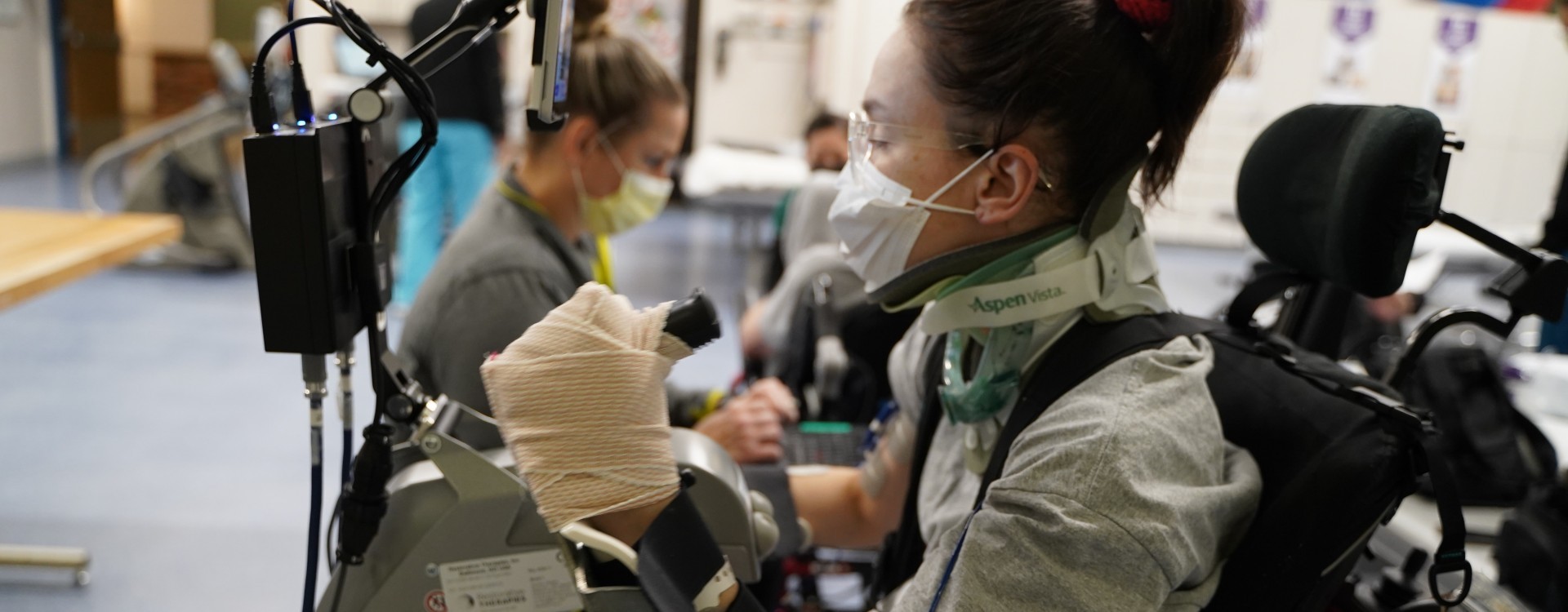Jemima Menkhus had different expectations for the end of her year. In early December 2022, a new career opportunity in Louisville, Kentucky, led her to uproot her life in Portland, Oregon, and relocate across the country. Unfortunately, Jemima’s future took an unexpected turn.
“I had a tire blowout about 30 minutes west of Lincoln, Nebraska,” Jemima said. “And my car rolled on me.”
Rescue teams life-flighted Jemima to Bryan Medical Center in Lincoln, Nebraska. Jemima underwent surgery and doctors determined she had sustained a complete C6 spinal cord injury.
“That was kind of the start to this new adventure,” Jemima said. “I was expecting moving cross country, but [I] moved into this new body, and it’s been a very different adventure. But still new beginnings all the same.”
Like many patients recovering at Madonna, Jemima used technology for both her treatment and as an aid to daily life. Technology like the AC20, a medical device designed by Madonna’s Research Institute for Rehabilitation Science and Engineering hones in on each patient’s abilities (i.e. a sip/puff of air, wiggle of a toe, muscle twitch) to allow them to control their environment, from controlling the TV to switching on the lights to calling the nurse. For spinal cord injury patients with limited mobility like Jemima, the AC20 can be extremely useful, especially in the early days of treatment as it provides their first sense of independence since their injury.
“In a traditional hospital environment, the lack of strength and control of her fingers severely limits her ability to operate common controls in her room, such as her television, lighting, and even her nurse call,” Tabatha Sorenson, one of Madonna’s occupational therapists who worked with Jemima, said. “The AC20 adapted Jemima’s hospital environment to give her full, independent control of her environment with the use of a single, easy-to-activate button. Jemima’s love for technology made it easy for her to harness the AC20 controls to gain her first success with independently accessing her hospital room environmental controls.”
Jemima agreed.
“The relief of knowing that if you are in a bind or you know, you can’t clear your throat or you need something from nursing staff, that you have the access to a call,” Jemima said. “Having that kind of integrated system with TV controls, lighting controls, gives you a lot of agency over an environment.”
Jemima spent much of her time at Madonna in physical therapy sessions, which slowly helped her rebuild and retrain her body where possible. Jemima’s therapists heavily incorporated the Functional Electrical Stimulation (FES) bike into her therapy.
“The FES bike has probably been the therapy other than the clinicians themselves, that I’ve been most thankful for,” Jemima said. “It’s kept my lower extremities that I have no control of probably in better shape than they’ve been in recent years, honestly.”
The FES bike uses electrical pulses to stimulate involuntary muscles, facilitating movement. Although it is a cycle, the FES does more than treat lower body muscles. Jemima also saw great progress in her upper body strength as well.
“I know I’ve completely woken up my triceps on my left side,” she said. “It’s been incredible to see the gains I’ve been able to make in maneuvering my body.”
While technology played a significant role in Jemima’s recovery, she also credits her care team with providing the morale needed to keep pushing forward.
“The staff has been incredible,” she said. “This staff has just been extremely tender and compassionate and very human. It really could feel like a very, isolating kind of infantile thing. But when you have staff that is so comfortable with it, there’s not really room for your own discomfort.”
Jemima hasn’t been alone in her rehabilitation journey. During her time at Madonna, she had her family to help her along the way. Madonna works to provide accommodations for the families of patients who require an extended stay.
“I’m really thankful for that just to be on site and to have such a calm and comfortable environment for them to go back to after seeing a family member in a very different circumstance than the last time they saw me,” Jemima said.
Despite the major disruption to her life, Jemima hasn’t lost hope or sight of what might have been.
“Not just to be alive and have my mind and have my spirit intact but to be in this place in this time,” Jemima reflected. “I feel very fortunate. It’s just been so wild. I came through Wyoming on the first freeze, in the first snow of the year and it was auto carnage. [The fact that] it happened here and not in national park territory where there aren’t even any residents in freezing temperatures. It could have just gone so differently.”
That optimism and gratitude keep Jemima focused on the progress she’s making every day.
“You know, there’s a lot of small victories and some defeats along the way as you’re learning to navigate in a new body,” Jemima said. “This is the beginning phase, and it really only can get better.”





